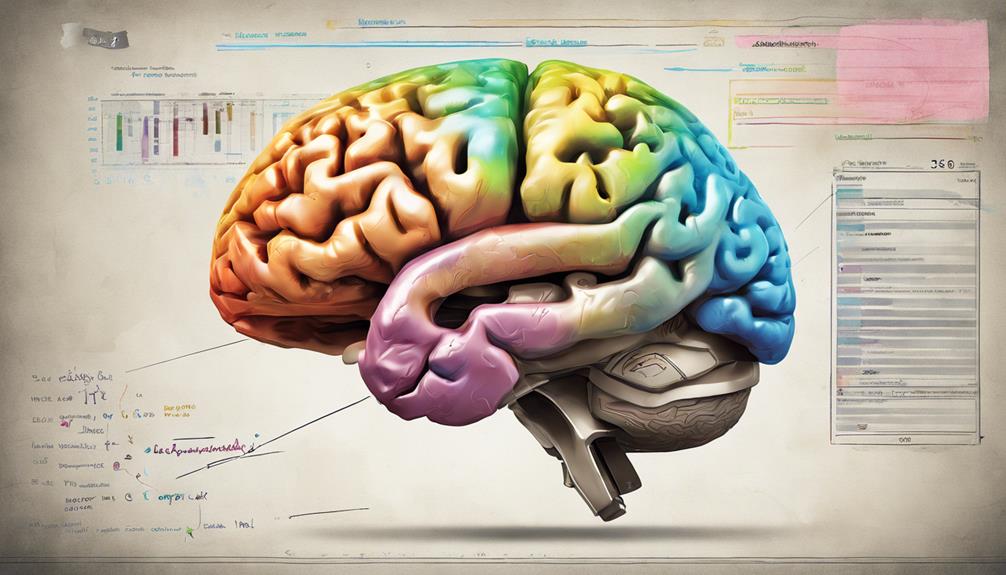Discover the neuroscience and psychology behind effective goal tracking. Dopamine drives motivation; visuals sustain it. Different brain parts collaborate in pursuing goals. Monitoring progress boosts drive and accountability. Cultivating a motivational culture enhances teamwork. CEOs and fitness buffs see success through tracking. Specific, measurable goals enhance achievement. Utilize tools for efficient progress monitoring. Dopamine impacts goal attainment. Create action plans and visualize progress for motivation. Understanding brain functions is key to successful goal tracking. Want to know more about releasing your full potential?
Key Takeaways
- Dopamine plays a key role in motivation and pleasure, essential for effective goal tracking.
- Visualization techniques help maintain healthy dopamine levels crucial for sustained goal pursuit.
- Clear and specific milestones enhance accountability and motivation in goal tracking.
- Tracking progress boosts self-confidence and reinforces positive behaviors for goal achievement.
- Monitoring and analyzing data consistently are vital for achieving desired outcomes in goal tracking.
Neuroscience of Goal Setting

Understanding the neuroscience of goal setting is fundamental for optimizing your motivation and achieving success. Dopamine, a key player in the brain's reward system, is crucial for driving you towards your goals. It influences neuron signal transmission essential for motivation and pleasure, making it a cornerstone in goal pursuit.
Brain regions like the amygdala, ventral striatum, and prefrontal cortex collaborate in setting and executing goals, showcasing the intricate neural processes involved. When dopamine levels are low, your ability to pursue and achieve goals may be hindered. However, employing strategies such as visualization techniques can help maintain a healthy dopamine flow, enhancing your goal-directed behavior.
Additionally, dopamine depletion can impact how the brain allocates responses, potentially affecting your focus on goal attainment. Furthermore, the body's perception of space also plays a role in evaluating goal progress and triggering dopamine release during the pursuit of your objectives.
Psychology of Goal Tracking
You understand the importance of monitoring your progress towards achieving your goals, as it helps you stay motivated and focused.
By tracking your behavior patterns, you can identify what strategies work best for you and make necessary adjustments along the way.
Visualizing your goal achievement through consistent tracking reinforces positive behaviors and boosts your confidence in your ability to succeed.
Goal Progress Monitoring
By regularly monitoring your progress towards your goals, you can increase accountability and motivation, ultimately enhancing your chances of successful goal achievement. Research indicates that individuals who actively track their progress are more likely to reach their goals successfully.
Monitoring progress not only provides a sense of accomplishment but also boosts self-confidence. It allows you to identify obstacles, make necessary adjustments, and stay on track towards goal completion. Setting specific milestones is essential in effective goal tracking.
Utilizing tools such as goal-tracking apps or journals can help you monitor your progress more efficiently. Additionally, celebrating small victories along the way can further motivate you to continue working towards your goals.
Tracking Behavior Patterns
Monitoring behavior patterns is a key aspect of goal tracking in psychology, allowing you to assess progress towards achieving your set goals. By tracking how your behaviors align with your objectives, you can identify areas for improvement and fine-tune your strategies for goal attainment.
Research indicates that individuals who monitor their progress are more likely to successfully achieve their goals than those who do not. This monitoring provides valuable feedback, increases your sense of accountability, and boosts motivation to stay focused on your targets.
Utilizing tools like apps or journals for goal tracking can enhance your self-awareness and help drive consistent progress towards your goals. By paying attention to your behavior patterns and making adjustments as needed, you can optimize your path towards goal achievement and maintain the momentum needed to reach your desired outcomes.
Visualizing Goal Achievement
The psychology of goal tracking explores the power of visualizing goal achievement to enhance motivation and focus. Visualization and mental imagery play pivotal roles in boosting goal commitment.
When you visualize yourself successfully reaching your goals, your brain activates the same areas as if you were actually performing the task. This activation not only motivates you but also improves your self-confidence and belief in achieving the desired outcomes.
Studies have shown that incorporating mental imagery into goal tracking can increase your commitment to your goals and enhance your persistence in pursuing them. The brain's inability to distinguish between imagined and real experiences makes visualization a potent tool for goal tracking.
Impact on Culture

Tracking and achieving goals within a culture can greatly influence team dynamics and performance. Setting clear goals not only motivates individuals but also unites teams towards a common purpose. When everyone understands the objectives and is aligned in their pursuit, motivation levels soar.
By providing the necessary tools and resources, you empower your team to work towards goal achievement with confidence. Breaking down these goals into smaller, achievable milestones can help prevent feeling overwhelmed and increase progress. This approach not only boosts motivation but also instills a sense of belief in the team's capabilities.
Encouraging a culture of collaboration among team members enhances communication, idea sharing, and collective problem-solving, ultimately accelerating goal achievement. When team members collaborate effectively, they not only support one another but also leverage each other's strengths to drive success.
Cultivating a culture that values motivation, goal setting, and team collaboration can lead to improved performance and a more cohesive team dynamic.
Real-World Applications

You can apply the science of effective goal tracking in real-world scenarios to see tangible results. By setting written goals and tracking progress using specific metrics, you can boost your motivation and focus.
Real-world success stories often highlight the power of goal setting and tracking in achieving remarkable outcomes.
Practical Applications
Entrepreneurs, fitness enthusiasts, students, and successful CEOs all find practical value in actively tracking and monitoring their goals for increased accountability and motivation.
Studies consistently show that tracking progress on written goals helps us stay focused and committed to our objectives.
Entrepreneurs, for instance, rely on goal tracking to achieve business milestones, guiding them towards success.
Fitness enthusiasts benefit greatly from tracking their fitness goals, as it allows them to measure their progress, stay motivated, and make necessary adjustments to their routines.
Similarly, students who keep track of their educational goals witness academic improvements through increased dedication and organization.
Successful CEOs credit their achievements in business to consistent goal tracking, emphasizing the importance of monitoring progress to ensure strategic alignment and continuous improvement.
Tangible Results
Utilizing effective goal tracking strategies in your daily life can lead to tangible results that pave the way for personal and professional success. Studies have shown that incorporating goal tracking into your routine can greatly boost your motivation to pursue and achieve your objectives. By actively monitoring your progress, you're more likely to stay focused and committed to reaching your goals.
Entrepreneurs who implement goal tracking tools report increased productivity and a higher rate of goal achievement. This psychological aspect of goal tracking plays an essential role in driving individuals towards success. The discipline and structure provided by goal tracking methods help individuals maintain consistency and momentum in their pursuits.
Goal tracking apps and systems serve as valuable resources in keeping users accountable and on track. Successful individuals attribute their accomplishments to the clarity and direction that goal tracking provides. By tracking your goals consistently, you create a roadmap to success and enhance your chances of turning your aspirations into reality.
Success Stories

Among those who've implemented effective goal tracking methods, numerous success stories have emerged, demonstrating the tangible benefits of this practice across various domains.
Successful CEOs credit their achievements to the meticulous tracking of their goals, enabling them to steer their companies towards success.
Fitness enthusiasts have witnessed remarkable progress by diligently monitoring their fitness goals, leading to improved health and well-being.
Students who consistently track their academic goals have shown higher academic performance, highlighting the positive impact of goal tracking on educational outcomes.
In different fields, high achievers attribute their success to the discipline of setting, monitoring, and achieving goals.
Case Studies

Case Study Results provide valuable insights into the impact of written goals on achievement.
Application Examples showcase how goal tracking can be applied in real-life scenarios for success.
Success Stories highlight the effectiveness of goal tracking in various aspects of personal and professional life.
Case Study Results
Case studies reveal the significant impact of tracking progress towards goals on accountability and motivation. Successful CEOs attribute a large part of their achievements to consistently tracking progress towards their goals. This practice not only helps them stay focused but also holds them accountable for their actions and decisions.
Additionally, studies show that fitness enthusiasts who track their fitness goals are more likely to see tangible progress and maintain their motivation levels over time. Similarly, students who regularly track their academic goals tend to perform better in their studies. By monitoring their progress and adjusting their strategies as needed, students can stay on track and achieve their desired academic outcomes.
Written case studies provide concrete examples of how goal tracking can effectively lead individuals towards achieving their personal and professional aspirations.
Application Examples
Successful individuals across various fields have demonstrated the power of actively tracking their goals through real-world application examples.
For instance, a study published in the Journal of Experimental Psychology highlighted that setting realistic expectations and breaking them down into smaller milestones can greatly enhance goal achievement. CEOs who maintained written goal tracking systems reported substantial contributions to their success.
Additionally, fitness enthusiasts who diligently tracked their goals in a journal experienced a remarkable 42% increase in goal attainment compared to their counterparts who didn't track progress. Similarly, students who implemented a goal tracking system witnessed a 30% improvement in their academic performance.
Entrepreneurs who consistently monitored their business goals also reaped the benefits, reporting a 65% higher success rate than those who didn't track their objectives. These real-world examples underscore the effectiveness of goal tracking in various aspects of life, emphasizing the importance of setting clear goals and monitoring progress towards them diligently.
Success Stories
High-achievers across various fields have exemplified the impact of diligent goal tracking through compelling success stories. Successful CEOs credit their accomplishments to meticulous goal tracking practices. By consistently monitoring their progress, fitness enthusiasts witness remarkable results in their fitness journeys.
Students who uphold a detailed goal tracking system often excel academically, showcasing the power of tracking goals. Furthermore, writing down goals and monitoring progress is a common strategy among high achievers in diverse professions. These success stories highlight how goal tracking aids individuals in staying accountable, motivated, and focused on achieving their desired outcomes.
- CEOs attribute achievements to diligent goal tracking practices.
- Fitness enthusiasts see better results in their fitness journeys through consistent progress tracking.
- Students performing better academically with a detailed goal tracking system.
- Writing down goals and tracking progress is a common practice among high achievers.
Research Findings

Research findings indicate that setting specific, measurable, and challenging goals leads to improved performance and goal achievement. The Psychology of Goal research on goal-setting reveals that when individuals set clear objectives that are quantifiable and require effort to accomplish, they're more likely to excel.
Studies highlight that regularly monitoring progress towards these objectives boosts both accountability and motivation. By tracking their goals, individuals enhance self-awareness, enabling them to adapt their strategies for better goal attainment. Effective methods for goal tracking include utilizing apps, spreadsheets, or journals to monitor progress and maintain focus on the end goal.
Research suggests that individuals who actively track their goals are more likely to succeed compared to those who don't track their progress. Incorporating specific, measurable, and challenging goals coupled with consistent tracking can boost your performance and increase the likelihood of achieving your targets.
Key Study Results

How do written goals contribute to enhancing accountability and motivation in goal tracking?
Research has shown that setting specific goals leads to higher motivation and increased chances of success. In Dr. Gail Matthews' study, participants who wrote down their goals were more likely to achieve them due to enhanced clarity and commitment.
Here are some key study results that highlight the benefits of written goals:
- Enhanced Clarity and Commitment: Writing down goals boosts clarity and commitment, making individuals more accountable for their actions.
- Increased Motivation: Written goals serve as powerful reminders, keeping individuals motivated to work towards their objectives.
- Improved Progress Tracking: Tracking progress becomes more manageable with written goals, leading to better accountability and goal achievement.
- Success Stories: Successful CEOs attribute their accomplishments to the habit of writing down business goals, showcasing the effectiveness of this practice.
Strategies for Success

To maximize goal achievement, implementing effective strategies for tracking progress is key in maintaining accountability and motivation.
Utilize tools like habit trackers, goal-setting apps, and spreadsheets to monitor progress efficiently.
Regularly review and adjust goals based on tracking data to improve goal-setting success.
Visualize your progress through charts, graphs, or logs to enhance motivation and focus on target outcomes.
Tracking metrics such as completion rates, time spent, and milestones reached provide valuable feedback for goal refinement.
By actively tracking your goals and progress, you can stay on course and make necessary adjustments to guarantee success.
Remember, consistency in tracking and analyzing your data is essential for achieving your desired outcomes.
Stay committed to your goals, track your progress diligently, and be open to adapting your strategies based on the insights gained from tracking to maximize your chances of success.
Brain Functions and Goal Attainment

Understanding the brain functions involved in goal attainment is fundamental for optimizing your goal-setting process and increasing your chances of success. Several key brain areas play significant roles in setting and achieving goals, such as the amygdala, ventral striatum, lateral prefrontal cortex, and orbital prefrontal cortex.
Dopamine, a neurotransmitter essential for motivation and pleasure, is particularly important in goal pursuit as it influences neuron signal transmission. Maintaining adequate dopamine levels is crucial for effectively pursuing and achieving your goals. Strategies like visualization techniques and creating specific action plans can help sustain dopamine flow, enhancing your ability to stay motivated and focused on your objectives.
Additionally, the perception of space, encompassing peri-personal and extra-personal spaces, can impact how you assess your progress towards your goals and influence dopamine release. By understanding these brain functions and incorporating effective techniques, you can optimize your goal attainment process and boost your success rate.
Frequently Asked Questions
What Is the Science Behind Goal Tracking?
To understand the science behind goal tracking, you should know that monitoring progress with quantifiable data boosts achievement rates. Tracking maintains focus, enhances motivation, and allows for necessary adjustments. Technology tools aid in efficient tracking. Goal tracking benefits also include providing a sense of accomplishment as milestones are reached, and can help identify areas where improvement is needed. Additionally, goal tracking allows for better time management and can help individuals prioritize their tasks to achieve their goals in a more organized and effective manner. Overall, the practice of goal tracking can significantly improve an individual’s ability to reach their desired objectives.
What Is the Psychology Behind Goal Setting?
Understand the psychology behind goal setting. Achieve success by crafting SMART goals. Shape self-perception, boost predictability, and add meaning to actions. Work with willingness, introspection, and realistic expectations. Emphasize ambitious yet attainable goals for best results.
What Is the Science Behind Writing Down Goals?
When you write down your goals, you enhance clarity, commitment, and increase the likelihood of achieving them. Tracking progress becomes seamless, providing a visual reminder of what needs to be done, boosting motivation and accountability.
What Is Locke's Goal Setting Theory?
You know Locke's Goal Setting Theory is about setting specific, challenging goals for better performance. It emphasizes clear, measurable goals to boost motivation and effort. Feedback and task complexity play an essential role in goal achievement.
Conclusion
To sum up, tracking your goals is essential for achieving success. Just like Sarah, a busy working mom who used a goal tracking app to lose 20 pounds and improve her overall health.
By setting specific targets, monitoring progress, and adjusting her approach as needed, she was able to reach her goals and transform her life.
Remember, with dedication and the right tools, you can turn your dreams into reality too!






